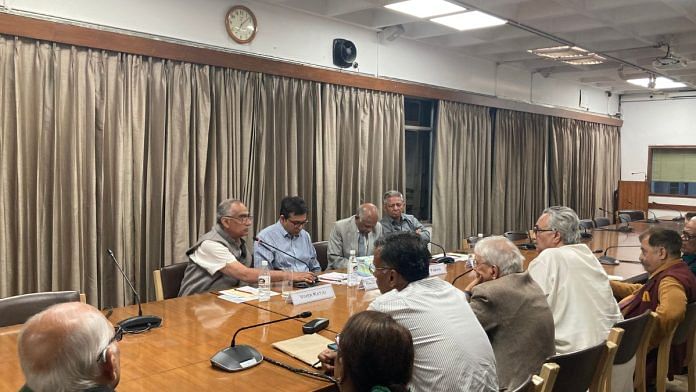New Delhi: Any New Delhi discussion on India’s neighbours inevitably comes down to government action—or inaction—when there is a domestic crisis in those countries. A panel discussion on Kallol Bhattacherjee’s book The Great Game in Afghanistan: Rajiv Gandhi, General Zia and the Unending War on 19 March at the India International Centre saw guests and panellists debate over whether India should have gone “all in” on Afghanistan.
An audience member pondered over whether Indian foreign policy is merely “reactive” or “inactive” when it comes to our immediate neighbourhood of Myanmar, Bangladesh and Afghanistan.
Bhattarcherjee offered an alternative perspective of how Indian foreign policy works – through organic links such as people-to-people ties rather than other forms of hard power like the use of our security forces or weaponising trade and investments.
“India has organic links with Myanmar, Bangladesh and Afghanistan,” said Bhattarcherjee in conversation with the former Indian ambassador to Afghanistan, Vivek Katju and former Indian ambassador to Romania and Italy, Rajiv Dogra. The discussion was moderated by former diplomat KP Fabian. “The civilians from these countries often come to India for healthcare or further studies. We have hospitals and other such projects in these countries. We are always hearing and learning from these ‘living bridges’,” Bhattarcherjee said.
He however conceded that it is unknown the extent to which the official machinery of India uses these “living bridges” for their foreign policy purposes.
Also read: India needn’t recognise Taliban but it shouldn’t let China keep Afghanistan away from it either
The question of what ifs
The book itself was first published in 2017, before the fall of Kabul and the establishment of the current Taliban government in Afghanistan. It explores the situation of Afghanistan in the late 1980s—when the country was under occupation by the Union of Soviet Socialist Republics (USSR) and a coalition of countries were attempting through diplomacy to set up a government.
At the same time, the Afghan mujahideen were being funded by Pakistan and other Western powers in their war against Mikhail Gorbachev’s Soviet Union. In the middle of this situation was the Indian Prime Minister Rajiv Gandhi, who supported then-Afghan president Mohammad Najibullah.
No trip down history’s memory lane is complete without the ‘what ifs’ and ‘what then’.
“What if Benazir Bhutto was the leader of Pakistan during this period? Would it have changed the outcome?” asked one audience member.
Bhattacherjee does not think it would have made a difference. “One must remember that General Zia’s actions in Afghanistan were such because of the existence of the organisation al-Zulfikar within its borders,” said Bhattacherjee.
Al-Zulfikar was a terrorist organisation set up by the Bhutto brothers—Murtaza and Shahnawaz – to avenge the killing of their father Zulfikar Ali Bhutto by General Zia in 1979.
Both the brothers eventually died in suspicious circumstances—Shahnawaz of suspected poisoning in France in 1985 and Murtaza during a police encounter in 1993. However, their acts of terrorism such as the hijacking of the Pakistan International Airlines Flight 326 were an embarrassment to General Zia-ul-Haq’s regime, said Bhattacherjee.
When another audience member wanted to know about China’s involvement during this period, Katju said that Beijing was active “every single day” in Afghanistan during the late 1980s. He, too, agreed that Benazir Bhutto as Prime Minister would not have changed the course of Afghanistan’s history.
“The army would not allow any civilian to not embrace the American position,” said Katju.
The Taliban, in power in Afghanistan since August 2021, has not been officially recognised by governments of the world including India. But the former Indian diplomat pointed out how, even today, Beijing appointed a new ambassador to Kabul.
“The Chinese want the mineral wealth of the Hindu Kush. There are substantial deposits of copper, iron and rare earth minerals. They are looking to integrate these resources with their western regions,” said Katju.
(Edited by Theres Sudeep)



